5 books about Manchester
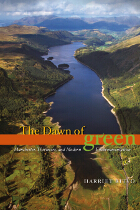
The Dawn of Green
Manchester, Thirlmere, and Modern Environmentalism
Harriet Ritvo
University of Chicago Press, 2009
Located in the heart of England’s Lake District, the placid waters of Thirlmere seem to be the embodiment of pastoral beauty. But under their calm surface lurks the legacy of a nineteenth-century conflict that pitted industrial progress against natural conservation—and helped launch the environmental movement as we know it. Purchased by the city of Manchester in the 1870s, Thirlmere was dammed and converted into a reservoir, its water piped one hundred miles south to the burgeoning industrial city and its workforce. This feat of civil engineering—and of natural resource diversion—inspired one of the first environmental struggles of modern times. The Dawn of Green re-creates the battle for Thirlmere and the clashes between conservationists who wished to preserve the lake and developers eager to supply the needs of a growing urban population. Bringing to vivid life the colorful and strong-minded characters who populated both sides of the debate, noted historian Harriet Ritvo revisits notions of the natural promulgated by romantic poets, recreationists, resource managers, and industrial developers to establish Thirlmere as the template for subsequent—and continuing—environmental struggles.
[more]
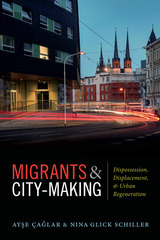
Migrants and City-Making
Dispossession, Displacement, and Urban Regeneration
Ayse Caglar and Nina Glick Schiller
Duke University Press, 2018
In Migrants and City-Making Ayşe Çağlar and Nina Glick Schiller trace the participation of migrants in the unequal networks of power that connect their lives to regional, national, and global institutions. Grounding their work in comparative ethnographies of three cities struggling to regain their former standing—Mardin, Turkey; Manchester, New Hampshire; and Halle/Saale, Germany—Çağlar and Glick Schiller challenge common assumptions that migrants exist on society’s periphery, threaten social cohesion, and require integration. Instead Çağlar and Glick Schiller explore their multifaceted role as city-makers, including their relationships to municipal officials, urban developers, political leaders, business owners, community organizers, and social justice movements. In each city Çağlar and Glick Schiller met with migrants from around the world; attended cultural events, meetings, and religious services; and patronized migrant-owned businesses, allowing them to gain insights into the ways in which migrants build social relationships with non-migrants and participate in urban restoration and development. In exploring the changing historical contingencies within which migrants live and work, Çağlar and Glick Schiller highlight how city-making invariably involves engaging with the far-reaching forces that dispossess people of their land, jobs, resources, neighborhoods, and hope.
[more]
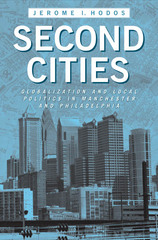
Second Cities
Globalization and Local Politics in Manchester and Philadelphia
Authored by Jerome I. Hodos
Temple University Press, 2013
Manchester, England, and Philadelphia, Pennsylvania, are what sociologist Jerome Hodos calls second cities—viable alternatives to well-known global cities such as London and New York. In Second Cities, Hodos provides a thought-provoking, comparative look at these cities as he considers how Manchester and Philadelphia have confronted problems of globalization over the past two centuries.
[more]
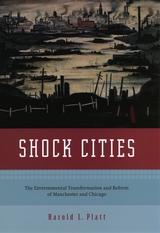
Shock Cities
The Environmental Transformation and Reform of Manchester and Chicago
Harold L. Platt
University of Chicago Press, 2005
Shock Cities is environmental history of the highest order. This searching work is the first trans-Atlantic study to examine the industrial city in holistic terms, looking at the transformation of its land, water, and air. Harold L. Platt demonstrates how the creation of industrial ecologies spurred the reorganization of urban areas into separate spheres, unhealthy slums in the center and garden estates in the suburbs. By comparing Chicago and Manchester, Platt also shows how the ruling classes managed the political creation of urban space to ensure financial gain—often to the environmental detriment of both regions.
Shock Cities also recasts the age of industry within a larger frame of nature. Frightening epidemics and unnatural "natural disasters" forced the city dwellers onto the path of environmental reform. Crusaders for social justice such as Chicago's Jane Addams and Manchester's Charles Rowley led class-bridging campaigns to clean up the slums. Women activists and other "municipal housekeepers" promoted regulations to reduce air pollution. Public health experts directed efforts to improve sanitation.
Out of these reform movements, the Progressives formulated new concepts of environmental conservation and regional planning. Comparing the two cities, Platt highlights the ways in which political culture and institutions act to turn social geography into physical shapes on the ground. This focus on the political formation of urban space helps illuminate questions of social and environmental justice. Shock Cities will be of enormous value to students of ecology, technology, urban planning, and public health in the Western world.
Shock Cities also recasts the age of industry within a larger frame of nature. Frightening epidemics and unnatural "natural disasters" forced the city dwellers onto the path of environmental reform. Crusaders for social justice such as Chicago's Jane Addams and Manchester's Charles Rowley led class-bridging campaigns to clean up the slums. Women activists and other "municipal housekeepers" promoted regulations to reduce air pollution. Public health experts directed efforts to improve sanitation.
Out of these reform movements, the Progressives formulated new concepts of environmental conservation and regional planning. Comparing the two cities, Platt highlights the ways in which political culture and institutions act to turn social geography into physical shapes on the ground. This focus on the political formation of urban space helps illuminate questions of social and environmental justice. Shock Cities will be of enormous value to students of ecology, technology, urban planning, and public health in the Western world.
[more]
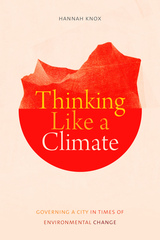
Thinking Like a Climate
Governing a City in Times of Environmental Change
Hannah Knox
Duke University Press, 2020
In Thinking Like a Climate Hannah Knox confronts the challenges that climate change poses to knowledge production and modern politics. Drawing on ethnographic fieldwork among policy makers, politicians, activists, scholars, and the public in Manchester, England—birthplace of the Industrial Revolution—Knox explores the city's strategies for understanding and responding to deteriorating environmental conditions. Climate science, Knox argues, frames climate change as a very particular kind of social problem that confronts the limits of administrative and bureaucratic techniques of knowing people, places, and things. Exceeding these limits requires forging new modes of relating to climate in ways that reimagine the social in climatological terms. Knox contends that the day-to-day work of crafting and implementing climate policy and translating climate knowledge into the work of governance demonstrates that local responses to climate change can be scaled up to effect change on a global scale.
[more]
READERS
Browse our collection.
PUBLISHERS
See BiblioVault's publisher services.
STUDENT SERVICES
Files for college accessibility offices.
UChicago Accessibility Resources
home | accessibility | search | about | contact us
BiblioVault ® 2001 - 2024
The University of Chicago Press









